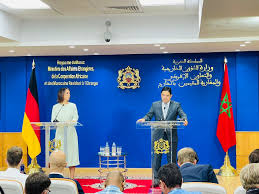
Berlin, 28/06/2024 (MAP) – Germany considers the Moroccan autonomy plan to be “a good basis and a very good foundation for the final settlement” of the Moroccan Sahara conflict, German Federal Foreign Minister Annalena Baerbock announced on Friday. Speaking at a press conference concluding the first session of the bilateral strategic dialogue between Morocco and Germany, which she co-chaired with Moroccan Foreign Minister Nasser Bourita, Baerbock emphasized the relevance of the Moroccan autonomy initiative. She reiterated Germany’s support for UN efforts to find a political solution to the Sahara conflict.
The bilateral strategic dialogue, initiated in accordance with the joint declaration adopted during Baerbock’s visit to Morocco on August 25, 2022, saw Bourita and Baerbock reaffirm their commitment to implementing the declaration and strengthening the multi-faceted partnership between the two nations. They highlighted their shared interest in bolstering bilateral economic and trade relations, emphasizing Morocco’s significant investment potential as outlined in the Moroccan Investment Charter.
In terms of migration cooperation, the ministers endorsed the efforts of the bilateral Joint Migration Group, which had its inaugural session on January 23, 2024. They agreed on the necessity of reducing irregular migration through a comprehensive approach that respects international human rights standards, and committed to enhancing professional mobility, legal migration, return, readmission, and reintegration.
Security cooperation was another key focus, with both ministers welcoming the joint declaration signed by their Interior Ministers on October 31, 2023, aimed at resuming cooperation in all areas of domestic policy. They expressed their shared ambition to deepen dialogue to address terrorism and other security challenges collaboratively, notably within the Global Coalition against Daesh and the Global Counterterrorism Forum.
The dialogue also underscored the importance of cooperation in climate policy, biodiversity, renewable energies, and green hydrogen, areas in which both countries intend to intensify their strategic collaboration. Bourita and Baerbock further agreed to promote bilateral cooperation in cultural and academic fields, aiming to strengthen ties between their peoples.
Germany also expressed its close monitoring of the initiatives launched by His Majesty King Mohammed VI for Africa, particularly the Royal Initiative to enable Atlantic Ocean access for Sahel States. The joint declaration adopted by Baerbock and Bourita commended Morocco’s active and constructive role in regional peace and stability, recognizing the Kingdom as an essential partner of the European Union, NATO, and Germany in Africa, and as a crucial link between North and South.
Germany praised the reforms undertaken by Morocco under the leadership of His Majesty King Mohammed VI, which have contributed to a more open and dynamic society and economy. Berlin reaffirmed its view of Morocco as a vital partner in fostering regional stability and prosperity.
In summary, the first session of the Morocco-German Multidimensional Strategic Dialogue marked a significant step in enhancing the bilateral relations between the two countries, covering a wide range of policy areas and laying a robust foundation for future cooperation.




